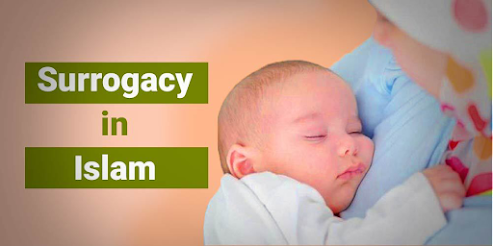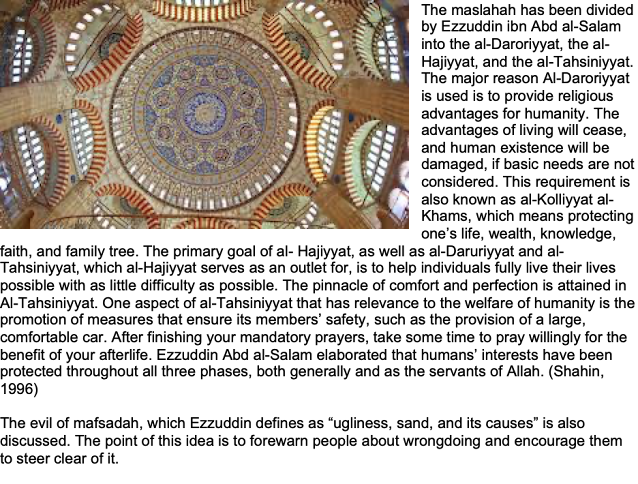"Surrogacy in Islam" AND "Contributions of Ezzuddin Ibn Abd Al-Salam to Maqasid Al-Shari’ah"

The new techniques introduced to family provisions include the surrogacy rent or the seedling of embryos; Some types of infertility have been cured by the West, and therefore scholars tried hard (fiqh al-nawazel) the legal ruling of this new crisis (Al-Romaih 2015-Al-bakry 2011).
Jurists agreed to forbid 3.4.5, but the difference was around 1.2 in three ways:
[1] Al-Tahreem (prohibition): The Islamic Fiqh Academy and the audience of modern scholars have been informed by the Qur'an, the Sunna, the rules and the plausible.
a. The Qur’an: والذين هُمْ لِفُرُوجِهِمْ حَافِظُونَ إِلاَّ على أَزْوَاجِهِمْ أَوْ مَا مَلَكَتْ أَيْمَانُهُمْ فَإِنَّهُمْ غَيْرُ مَلُومِينَ) المؤمنون5،6
(Those who protect their wives only or those who have their rights are not to blame) believers 5,6
Point of reference (wajh al-dalalah): The text emphasizes the inviolability of the rental of wombs because the preservation of the furies is absolute.
b. Sunna: (لا يحل لا مرئ يؤمن بالله واليوم الآخر أن يسقيَ ماءَه زرعَ غيرِه) The Messenger of Allah said: "It is not lawful for a person to believe in Allah and the Last Day to water another's seed."
Point of reference (wajh al-dalalah): explicitly prohibiting; because the fetus is fed by the mother's womb and by the husband's water of this egg-laying mother.
c. Rules: (al-qawa’ed):
1."الأصل في الأبضاع(الأرحام) التحريم" “The basic principle in the matter of wombs is that it is forbidden.” What is permissible is what is permitted by Sharia, and the permissibility of the womb is based on the correct contract, and the principle of marriage is prohibition.
2. "درء المفاسد مُقَدَّم على جلب المصالح"Prevention of corruption is provided to obtain interests", and the rental of the wombs is suspected of mixing lineages.
d. Reasonable:(al-ma’qoul): The womb is not subject to permissibility, giving to others, revealing a woman’s private parts are forbidden without necessity, and placing a man’s semen in the womb of a non-mahram woman has the meaning of adultery.
[2] Al-jawaz: Images 1, and 2 are permissible, Dr Abd al-Muti al-Bayoumi gave this opinion with conditions:
1- That the incubator is not virgin.
2- Istibra’a(استبراء) of the womb at least two menstrual cycles.
3- Consent of the husband or guardian.
4- Not having intercourse with the wife during the incubation of the egg.
Evidence:
a - Al-Qiyas: Measuring the rental of the uterus over the rental of the breast., both are for nourishing the fetus and the child.
b - Rules: (al-qawa’ed: “The basic principle in things is that they are permissible,” and there is no evidence for the prohibition, and “Need comes down to the status of necessity,” and the need here is the need for a child.
c - Reasonable:(al-ma’qoul): The reason for the prohibition here is the suspicion of adultery and the mixing of lineages, and there is no suspicion in this case.
Evidence:
a- Whoever permits the custodian to be the second wife of the husband; Because paternity is one and the family is interconnected, and there is no suspicion of mixed lineage.
b- An analogy with the Shariah license to rent a nursing woman, because the uterus and breasts provide food for the fetus, and if that is permissible in the breast, then the uterus is better.
c- Permissibility in things is the principle, and therefore the issue of a surrogate mother is permissible because there is no legal text. This is refuted by the fact that the permissibility is beneficial and not harmful in which the prohibition and the rule are that the basic principle in selling is a prohibition (Mahmoud,8-17).
The Islamic Fiqh Council retreated; there is a suspicion of genealogical mixing, invalidated the opinion of permissibility, and joined those who say that it is forbidden.
Conclusion:
Prohibition of renting in all its forms; as the validity and strength of the evidence, and the weakness of the evidence for the permissibility of renting, the Islamic Fiqh Academy in Makkah has approved the prohibition of all forms of renting, as well as the permanent medical jurisprudence committee in Jordan.
REFERENCES:
1) Al-bakry., A. (2011). Iste’jar al-arham [Available at: https://repository.nauss.edu.sa/handle/123456789/51567]
2) Al-Najjar. Al-talqeeh al-sena’e min manzour al-fiqh al-islamy. [Available at:
https://jfslt.journals.ekb.eg/article_10916_9c09661468ba090a9f48d3169b893c8.pdfp]
3) Al-Romaih., A. (2015) Tajeer al-rahem, hokmoh wa atharoh fi al-fiqh al-Islami. [Available at:
https://platform.almanhal.com/Reader/2/72835]
4) Annane, K. (2022). Naql al-rahem wa zarao bayna hokm al-dharourah wa maqasid al-shari’ah. majalet al-ostaz al-baheth lelderasat al-qanonyyah wa syasyyah.7(2), 1449-1472. [Available at:
https://www.asjp.cerist.dz/en/article/192909]
5) Benomar., M. (2009). men al-ijtihad fi al-nass ela el-ijtihad fi al-waqe’a (nahw mosahamah fi ta’seel fiqh al-waqe’a. Dar al-kotob ai-ilmeyyah
6) Fazzary., F. (2022) Al-talqeeh al-sena’ey wa atharoh fi al-fiqh al-islamy [Available at:
https://mkba.journals.ekb.eg/article_249575.html]
7) Hashi, A., (2019). Muslim Jurists’ View on Surrogate Motherhood. [Available at: https://journals.iium.edu.my/revival/index.php/revival/article/view/244/203]
8) Mahmoud., S. Tajeer al-arham wa atharoh fi nazr al-shari’a wa al-teb wa al-qanon8-17. [Available at:
https://www.iasj.net/iasj/download/4a47aefa166dcf30]
9) Shabana, A. (2015). Foundations of the Consensus against Surrogacy Arrangements in Islamic Law. Islamic Law and Society, 22(1/2), 82–113. [Available at:
Ezzuddin ibn Abd al-Salam states that the fundamentals of Maqasid al-Sharia’h are
protecting the righteous and avoiding committing wrong (Zulkayandri, 2017). The author faith claims that Izzuddin ibn Abd al-Salam asserts that, in order to have a complete understanding of Shari’ah, one must consider the Sunni and Qur’anic grounds in order to comprehend the rationale or goal of the Shari’ah that is presented, that is founded on the principle of maintaining virtue and avoiding undesirable effects. The next step in deciphering the text is to investigate the source (‘illah) of the desired result of Islamic law, known as al-Maqasid. The aims of Shari’ah must be scrutinized closely, not just superficially. Al-Hasan, an-Naf’u, and al-Hasanat are just a few of the books he draws from to define maslahah. Maslahah al-Mo’tabarah, the only kind of maslahah recognized by Islamic law, is in accordance with Shari’ah norms.
According to the teachings of Ezzuddin ibn Abd al-Salam, more additional traits of maslahah that are recognized by Islamic law are that it must be included in the maqasid al-Shari’ah and that it should not be neglected if it is more substantial or like it. Both points were made by Ezzuddin ibn Abd al-Salam. Protecting human flourishing requires taking measures to defend the maqasid al-five pillars of Shari’ah, which are religion, life, intellect, property, and lineage.
Mafsadah, according to Ezzuddin, is made up of two categories: large evils and minor evils. Apostasy, or the worship of a god other than Allah, is one of Islam’s most serious
transgressions, along with murder, qazaf (illegally taking the property of an orphan without their permission), riba (the charging of interest on loans), deserting the battlefield, and abandoning the Islamic state after migrating (Saifuddeen, 2014). Someone can be deemed guilty of major sin if they sin in an excessive manner; however, the level of evil that someone performed in committing a minor offence is what determines its classification.
Even though he doesn’t go into detail on mukallaf in maqasid al-Shari’ah, Ezzuddin does establish four requirements for it. The first step in avoiding both external and internal mafsadah is for mukallaf to act and have an aim that is consistent with maqasid al-Shari’ah. Second, the mukallaf’s disobedience to Allah’s commandments and pursuit of His prohibitions, violate the maqasid al-Shari’ah. Finally, while the intentions of mukallaf (qasad) are consistent with Islamic law, its practices run counter to the al-Maqasid. This act of mukallaf, as argued by Ezzuddin is not Mukallaf and is not punishable by Islamic law because it is thought to result in maslahah. The final point is that mukallaf aims to do something that is forbidden by Islamic law, but its actions, which consist of adhering to Islamic law, are commendable. The act of mukallaf, in this case, is bad behaviour that disqualifies the culprit from testifying in certain trials because it breaches Islamic law and the maqasid al-Shari’ah.
REFERENCES:
1) Saifuddeen, S.M., Rahman, N.N.A., Isa, N.M. and Baharuddin, A., (2014). Maqasid al-
Shari’ah as a complementary framework to conventional bioethics. Science and
engineering ethics, 20(2), pp.317-327.
2) Shahin, E.E., (1996). Secularism and nationalism: The political discourse of ‘Abd al-Salam
Yassin. In Islamism and secularism in North Africa (pp. 167-186). Palgrave
Macmillan, New York.











Comments
Post a Comment